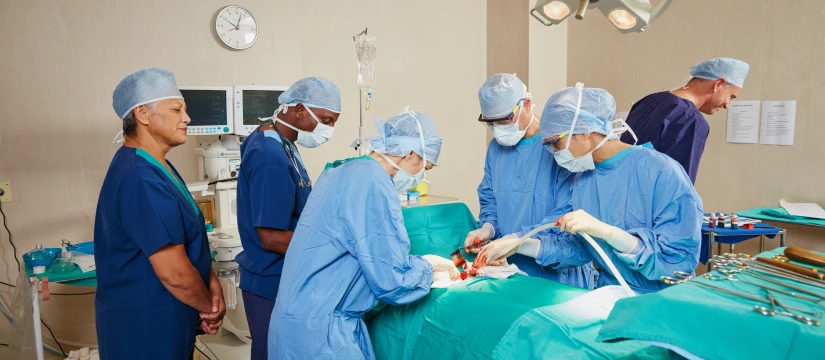Gastric sleeve surgery, also known as sleeve gastrectomy, is a popular weight-loss procedure that has gained significant attention for its effectiveness and relatively straightforward process. This surgery involves the removal of a large portion of the stomach, leaving behind a tube-like structure or "sleeve." If you're considering this procedure, it's essential to understand how it works, its benefits, and whether it’s the right option for you.
1. What is Gastric Sleeve Surgery?
Gastric sleeve surgery is a type of bariatric surgery aimed at helping individuals lose weight by restricting the amount of food the stomach can hold. During the procedure, approximately 75-80% of the stomach is removed, drastically reducing its size. The smaller, sleeve-shaped stomach limits food intake and reduces hunger by lowering the production of the hunger hormone ghrelin.
2. Who is a Candidate for Gastric Sleeve Surgery?
This surgery is typically recommended for individuals with a body mass index (BMI) of 40 or higher, or those with a BMI of 35 or higher who have obesity-related health conditions, such as type 2 diabetes, high blood pressure, or sleep apnea. Candidates should have tried and failed to achieve sustained weight loss through diet and exercise before considering surgery.
3. How Does Gastric Sleeve Surgery Work?
The surgery is performed laparoscopically, meaning small incisions are made, and a camera and surgical instruments are used to remove a portion of the stomach. The remaining stomach is stapled together to form a tube or sleeve, which holds significantly less food. As a result, patients feel full sooner and eat less, leading to weight loss.
4. Benefits of Gastric Sleeve Surgery
Gastric sleeve surgery offers several benefits, including:
- Significant Weight Loss: Most patients lose 50-60% of their excess weight within 18-24 months after surgery.
- Improved Health Conditions: The surgery can lead to the improvement or resolution of obesity-related conditions, such as type 2 diabetes, hypertension, and sleep apnea.
- Enhanced Quality of Life: Many patients experience improved mobility, increased energy levels, and a better overall quality of life following weight loss.
- No Foreign Objects: Unlike gastric banding, which involves placing a band around the stomach, the sleeve gastrectomy does not leave any foreign objects in the body.
- Reduced Hunger: By removing the part of the stomach responsible for producing ghrelin, the hunger hormone, patients often experience reduced appetite.
5. What to Expect After Surgery
Post-surgery, patients must follow a strict diet plan, beginning with liquids and gradually progressing to solid foods. Regular follow-ups with a healthcare provider are crucial to monitor progress and ensure proper nutrition. Patients will need to make lifelong changes to their eating habits and incorporate regular physical activity to maintain weight loss.
6. Potential Risks and Considerations
As with any surgery, gastric sleeve surgery carries potential risks, including bleeding, infection, and adverse reactions to anesthesia. Long-term risks may include nutrient deficiencies and the need for additional surgeries. It's important to discuss these risks with your surgeon and weigh them against the benefits.
Is Gastric Sleeve Surgery Right for You? Gastric sleeve surgery can be a life-changing procedure for those struggling with obesity and related health issues. However, it's not a quick fix and requires a commitment to a healthy lifestyle. If you're considering this surgery, consult with a qualified bariatric surgeon to discuss your options and determine if it's the right choice for your weight loss journey.
Frequently Asked Questions (FAQ) About Gastric Sleeve Surgery
1. What is the recovery time for gastric sleeve surgery?
Recovery time varies from person to person, but most patients can expect to stay in the hospital for 1-2 days post-surgery. Many people return to work within 2-4 weeks, depending on the nature of their job. Full recovery, including a return to normal activities, typically takes 4-6 weeks.
2. Will I need to follow a special diet after surgery?
Yes, after gastric sleeve surgery, you'll need to follow a specific diet plan. This usually starts with a liquid diet, followed by pureed and soft foods, before gradually reintroducing solid foods. Your healthcare team will provide detailed dietary guidelines to ensure proper healing and nutrition.
3. How much weight can I expect to lose after gastric sleeve surgery?
On average, patients lose about 50-60% of their excess weight within the first 18-24 months after surgery. However, individual results can vary based on factors such as adherence to dietary recommendations and exercise routines.
4. Are there any long-term dietary restrictions?
While there are no strict long-term dietary restrictions, you'll need to adopt healthier eating habits to maintain your weight loss. This includes eating smaller portions, choosing nutrient-dense foods, and avoiding high-calorie, sugary, and fatty foods.
5. Can the stomach stretch back to its original size after surgery?
Over time, the stomach may stretch slightly, but it won't return to its original size. To prevent significant stretching, it's essential to avoid overeating and follow the portion guidelines provided by your healthcare team.
6. Will I need vitamin and mineral supplements after surgery?
Yes, because the surgery reduces the size of the stomach, it can be more challenging to get all the necessary nutrients from food alone. Most patients will need to take daily vitamin and mineral supplements to avoid deficiencies, especially in vitamins B12, D, calcium, and iron.
7. Are there any non-surgical alternatives to gastric sleeve surgery?
Yes, non-surgical options for weight loss include lifestyle changes like diet and exercise, as well as medical treatments like prescription weight-loss medications and non-surgical procedures like gastric balloon. These alternatives are typically considered before opting for surgery.
8. Is gastric sleeve surgery reversible?
No, gastric sleeve surgery is not reversible. Once a portion of the stomach is removed, it cannot be replaced. This is why it's important to thoroughly consider the decision and discuss it with a healthcare professional.
9. How soon after surgery can I start exercising?
Light physical activity, such as walking, is encouraged as soon as possible after surgery to promote circulation and healing. Most patients can start more strenuous activities, like lifting weights or running, about 4-6 weeks after surgery, depending on their recovery.
10. What are the common side effects of gastric sleeve surgery?
Common side effects include nausea, vomiting, acid reflux, and temporary hair loss. These symptoms are usually manageable and improve over time. Long-term side effects may include nutrient deficiencies and changes in bowel habits.
11. Can gastric sleeve surgery help with other health conditions?
Yes, gastric sleeve surgery can significantly improve or even resolve obesity-related health conditions such as type 2 diabetes, high blood pressure, sleep apnea, and joint pain.
12. How much does gastric sleeve surgery cost?
The cost of gastric sleeve surgery can vary depending on factors like location, the surgeon’s expertise, and insurance coverage. On average, the surgery can range from $10,000 to $20,000 in the United States. Some insurance plans may cover part or all of the cost if certain criteria are met.
13. Will I have loose skin after losing weight with gastric sleeve surgery?
Rapid weight loss can sometimes result in loose or excess skin. The degree to which this happens varies based on factors like age, skin elasticity, and the amount of weight lost. Some patients opt for cosmetic surgery to remove excess skin after achieving their weight loss goals.
14. Is gastric sleeve surgery safe?
Gastric sleeve surgery is considered safe, with a relatively low risk of complications when performed by an experienced surgeon. However, as with any surgery, there are risks involved, including bleeding, infection, and adverse reactions to anesthesia. Discussing these risks with your surgeon can help you make an informed decision.
15. How soon can I return to normal eating after surgery?
The transition to normal eating typically occurs over several weeks. After starting with a liquid diet, you'll gradually move to pureed foods, soft foods, and finally solid foods. This process usually takes about 6-8 weeks, depending on your recovery and your surgeon's recommendations.
 Clinic Booking
Clinic Booking
.jpg)



 No Record
No Record